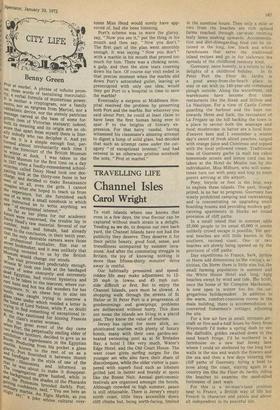Benny Green
Prot et rnarbel. A phrase of infinite promise, three words of tantalising inscrutability, a verbal formula of mysterious power. it is neither a cryptograrn, nor a family motto, nor an epigram from Martial, nor a cabbalistic device, nor the sternly patrician message carved at the base of some forgotten item of Victorian statuary; indeed, both its meaning and its origin are so obscure that apart from myself there is literally nobody who can decipher it. And yet for me it is a simple enough feat, performed almost involuntarily each time I Pass the forecourt of the British Museum in winter at dusk. I was taken to the 13ritish Museum for the first time on a day in 1937 when a fondly-remembered schoolmistress called Daisy Head took one desPairing look at the thirty-one faces in her Charge, and decided to make Renaissance men of us all, even the girls. I cannot itnagine what she hoped to teach us from the r, experience, but she furnished each 'ne of us with a small notebook in which she instructed us to write anything we saw " Of exceptional interest." 8° far as her plans for our academic future were concerned, the trouble lay in Dais)? Head's raw material. Several of our nuthher, male and female, had already coine to the conclusion, in their tenth year, that the only desirable careers were those of professional footballer, film star or street bookmaker, and it was unlikely that anYthing revealed to us by the British Museum would change our minds. wThe visit proceeded predictably enough. intlie W took one look at the bandaged corpse of some obscurely and extremely dead Egyptian, had violent hysterics and had to be taken to the tearoom, where currant buns and hot tea did wonders for her _oitiposure. N, an obese boy in size ten caught trying to unscrew a case under which resided a letter in t"e hand of Lord Nelson, while P, no doubt terYing t° find something of exceptional inRrest, was cautioned for kissing Frances _the class's scarlet woman, wtiuten the great event of the day came t,..n_ port, the perpetually smiling elder of LTI,.a.sinine brothers, decided to give us an 11,..Innition of legerdemain in the Egyptian z„..rrotr, le 1. Producing from his pocket a glass anccr, known to the rest of us as a ii' Port flourished it between thumb tn,„,:c'refinger in the style of one of the thZt‘e! illusionists and informed us The he Was about to make it disappear. thebt),_tigregation grew hushed, while in and 'ettground the shades of the Pharaohs gaini the Ptolemies brooded darkly. Port, otabrillg confidence, said, "You see here an Thiop`Y Marble. An Elgin Marble, as you saY," a joke whose cultural over tones Miss Head would surely have approved of, had she been listening, Port's scheme was to wave the glarny, say, "Now you see it," put the thing in his mouth and then say, "Now you don't." The first part of the plan went smoothly enough. It was saying Now you don't" with a marble in his mouth that proved too much for him. There was a choking noise, a gulp, and then the slow tears coursing down his face. Of course our visit ended in that precise moment when the marble slid down Port's astonished gullet, leaving us preoccupied with only one idea; would they get Port to a hospital in time to save the marble?
Eventualty a surgeon at Middlesex Hospital resolved the problem by preserving both Port and the marble. But whatever you said about Port, he could at least claim to have been the first human being ever to spur P to the heights of literary expression. For that hairy vandal, having witnessed his classmate's amazing attempt to digest a lump of solid glass, had decided that such an attempt came under the category "of exceptional interest," and had entered in an otherwise pristine notebook the note, "Prot et marbel."










































 Previous page
Previous page